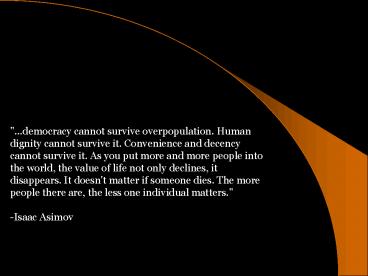The PopulationCrisis
1 / 15
Title: The PopulationCrisis
1
"...democracy cannot survive overpopulation.
Human dignity cannot survive it. Convenience and
decency cannot survive it. As you put more and
more people into the world, the value of life not
only declines, it disappears. It doesn't matter
if someone dies. The more people there are, the
less one individual matters." -Isaac Asimov
2
The Population Crisis
- A look at the facts and figures.
3
Introduction to Population
- The human population has been steadily increasing
since the dawn of the industrial revolution.
- The worlds population is estimated to stabilize
by the year 2050.
4
Demographic History
- The growth of human population can be considered
almost negligible preceding the outbreak of the
Black Plague in the mid-1300s.
TIMELINE
1804 1st billion
1927 2nd billion
1960 3rd billion
1974 4th billion
- After the plague, the population took off and
has been soaring ever since.
1987 5th billion
1999 6th billion
5
- The population has distributed itself throughout
the entire globe and continues to expand.
- As our population grows, it threatens the
existence of many plant and animal species.
6
The Definitions
Population - the number of people in given area,
such as in a city, town or country.
Overpopulation - the number of people in an area
relative to its resources and the capacity of the
environment to sustain human activities.
Overconsumption - a concept coined in developing
nations to counter the rhetoric of overpopulation
by which developed nations judge them as
consuming more than their economy can support.
7
Were Overpopulated
- It is extremely important to note that the modern
definition of overpopulation has absolutely
nothing to do with geography or population
density.
- What it actually deals with is the carrying
capacity of any particular area (i.e. a town,
region, country, and so on.
- The wealthiest 20 of the population (1.2B)
consume 86 of all resources. Broken down, this
includes
- 45 of all meat and fish
- 58 of all energy
- 87 of all vehicles
8
Were Overpopulated
- As developing nations continue to grow and attain
more affluence, its citizens will begin to
consume more products, such as food, oil and
electricity and place a further strain on
available resources.
- The more people that live the western culture
translates into less availability of resources
worldwide.
- This phenomenon is known as entering the
consumer class- 1.7B are currently in this
class.
9
(No Transcript)
10
- Therefore, the more people that enter
high-consumption lifestyles will result in a
further reduction in resources-creating
overpopulation.
11
China A Closer Look
- Currently, Chinas population is rapidly
changing to consumer-class lifestyles. Evidence
of this includes
- a consumer constitute of just 16, allowing for
the remainder of the population to continue to
grow.
- the addition of over 4 million automobiles in
2003. Auto sales last year increased by over 80,
along with 60 the year before.
- If these trends continue, there will be 150
million cars on Chinese streets in roughly 12-15
years. That figure is more than all the American
cars currently on the road.
- Now imagine this throughout all the nations in
Southeast Asia. There is simply not enough
resources available for everyone to live
high-consumption lifestyles.
12
Can We All Live Luxuriously?
- Unfortunately, the answer is a definite NO. The
earth could not even attempt to sustain itself if
every human consumed as much as westerners.
- The following is a chart by Ross McCluney, a P.hD
professor at Eastern Kentucky University.
- He combined several population estimate equations
(such as Ehrlichs IPAT equation), collected data
and made predictions on varying world populations.
13
(No Transcript)
14
What It All Means
- If the way so many of us live everyday does not
change, a serious threat is imminent in regards
to the future of mankind.
- There are several possible solutions
1. Reduce the amount of people entering consumer
class lifestyle.
2. Drastically change our own lifestyles in
order to help earth sustain itself.
3. Attempt to equalize all the resources
worldwide so as many people as possible have
their fair share.
4. Restrict developing nations from advancing
(i.e. impose tariffs, fines and available
resources.)
15
We have been God-like in our planned breeding of
our domesticated plants and animals, but we have
been rabbit-like in our unplanned breeding of
ourselves. -Arnold Toynbee































